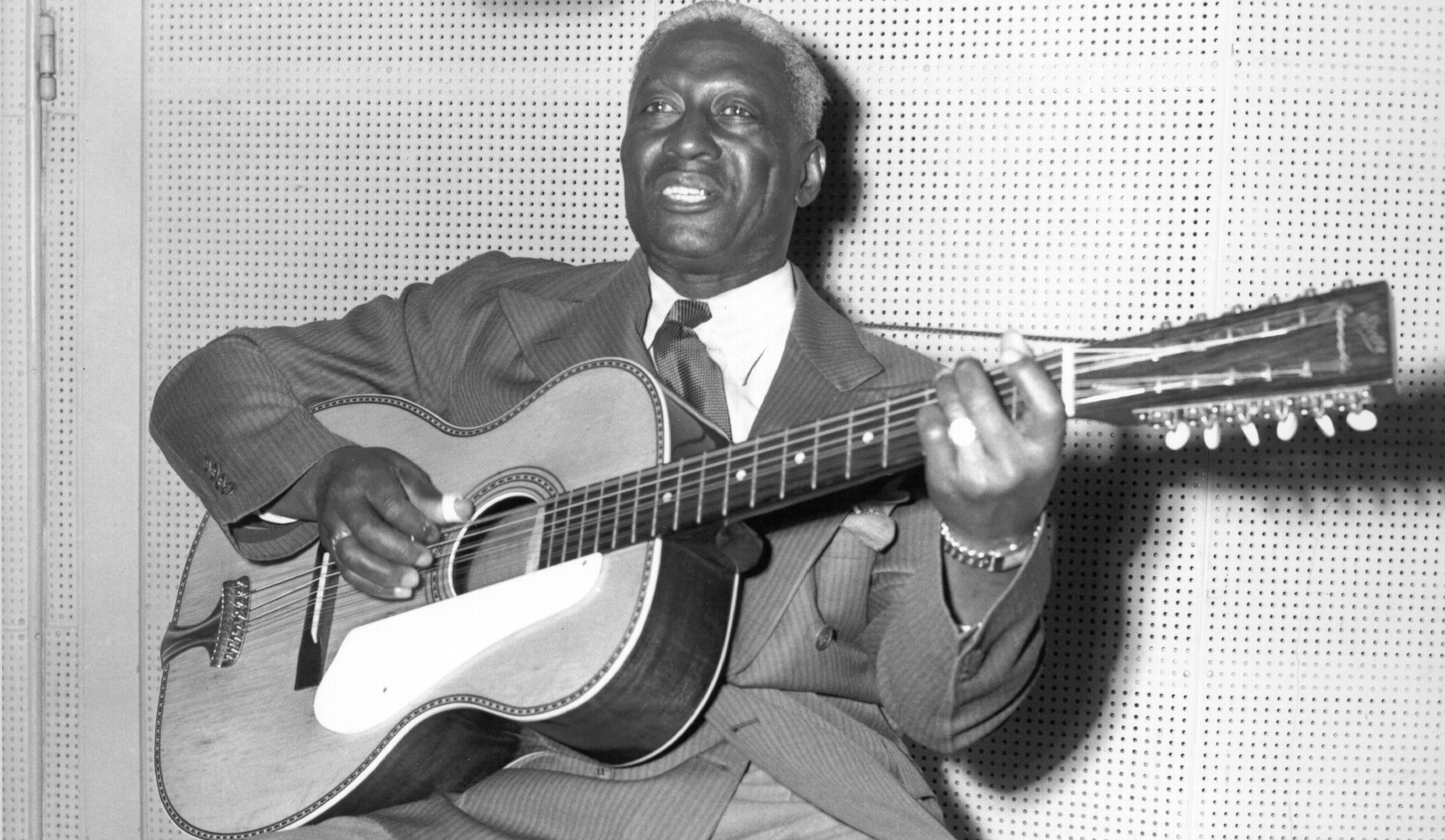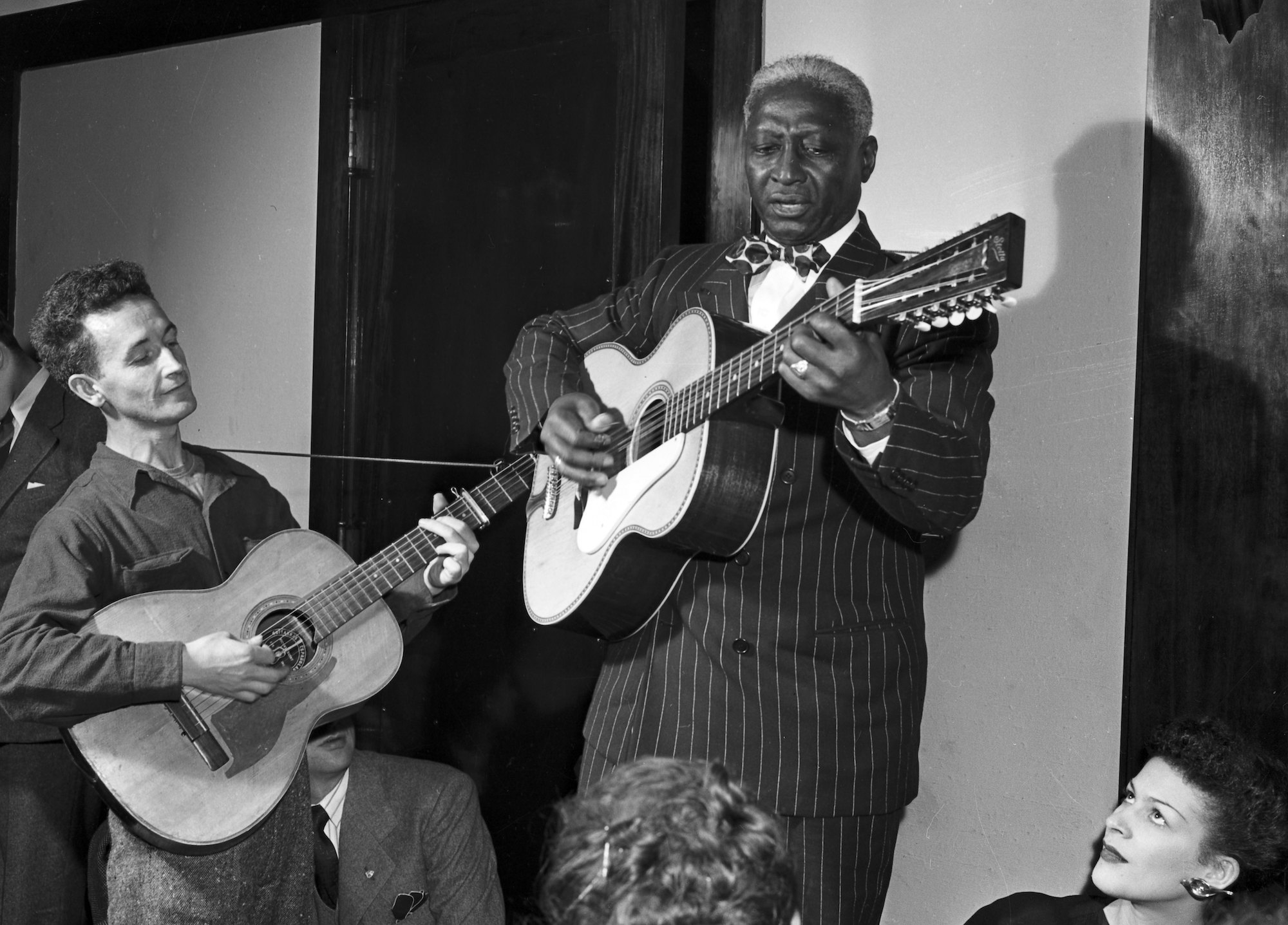His underrated guitar playing influenced everyone from the Beatles to Nirvana – here's how Lead Belly used his 12-string skills to play his way out of prison
Huddie Ledbetter's magnetic musical talent got him an early release from a hellish Texas prison – yet his full impact on 20th century guitar playing is often overlooked

To modern audiences, Huddie Ledbetter (aka Lead Belly) is a bit of a mythical figure, probably best-known for a performance that occurred almost half a century after his death.
Nirvana's Kurt Cobain was so moved by the power of Lead Belly's rendition of the folk song, Where Did You Sleep Last Night, that he chose to cover the tune with his band as the closing number of their now-legendary MTV Unplugged set.
Of course, that performance in particular is almost impossible to separate from the context of Cobain taking his own life less than five months after the MTV special was recorded. Indeed, the Nirvana frontman took the simmering folk-blues number and imbued it with a desperation that's incredibly haunting when viewed with the benefit of hindsight.
Though Nirvana's version of the song – also known as In the Pines – will likely remain the best-remembered for decades to come, Lead Belly's take is powerful itself. Even through the hiss of the less-than-ideal recording equipment of the time, you really get a sense of not only the Louisiana native's guitar-picking abilities, but also his raw charisma as a performer.
His magnetic talent, and the way he updated handed-down traditional songs with a bold mix of influences from across the musical spectrum, would in turn inspire guitarists and singer-songwriters the world over for generations. It also, in 1925, helped him get out of prison.
By all accounts, Huddie Ledbetter led quite a life. There are a number of theories as to how he got his stage name, all of them fantastic.
Some said it was due to his ability to drink incredible amounts of liquor; some said there was buckshot lodged in his abdomen. Others said it sprang from his undeniable toughness. Wherever it came from, 'Lead Belly' was – in Woody Guthrie's words – “the hard name of a hard man.“
All the latest guitar news, interviews, lessons, reviews, deals and more, direct to your inbox!
Toughness aside, though, Lead Belly was a magnificent guitarist with a deft touch.
Referencing Lead Belly's trademark acoustic 12-string guitar, Guthrie once recalled, “I listened as he tuned up his twelve-string Stella and eased his fingers up and down along the neck in the same way that the library and museum clerk touched the frame of the best painting in their gallery.“
Lead Belly's acoustic guitar also served him well in prison, where he spent a number of years – in two stints, in two different states – after killing a man in a fight in Dallas in 1918, and, later, after injuring a man in another fight in Louisiana in 1930.
It was during the first of those prison sentences – set originally at 30 years – that Lead Belly found himself performing, as he often did to entertain guards and fellow inmates, for one Pat Morris Neff, then the Governor of Texas.

Neff had been elected to office in 1920 on a hard-nosed, law-and-order platform, with particular emphasis on one point: no pardons would be issued from his office to prisoners.
“I want the boys of Texas to realize that the penitentiary is the very worst place in the world to have to go to,“ Neff declared, “only through the dissemination of this knowledge can the present wave of crime be stopped.“
Needless to say, circumstances in Sugar Land prison – where Lead Belly was serving his sentence – were bleak at the best of times. One can certainly understand why, when Neff stopped by for a visit, Lead Belly wanted to make a positive impression.
Dropping the raunchier material from his typical setlist, Lead Belly sang and played religious songs like What a Friend We Have in Jesus, and – at Neff's request – country/bluegrass and folk standards like Old Dan Tucker and Down in the Valley.
Lead Belly then sang a song – made up, apparently, on the spot – that was directed at the governor by name. Appealing to Neff's religious beliefs, he passionately asked the governor, in song, for his freedom.
The performance indeed made an impression on Neff, so much so that he – in rather revolting terms – dangled the possibility of a pardon before the guitarist on the strength of it. “I’m going to turn you loose after a while,” he is said to have told the musician, “but I’m going to keep you here so you can pick and dance for me when I come down [to Sugar Land].”
After stringing him along for months, on January 16, 1925 – one of Neff's final days in office – Huddie Ledbetter [under the assumed name Walter Boyd] became one of just five prisoners in Texas to receive a pardon from the governor.
When Lead Belly found himself behind bars again a few years later – this time serving a sentence at Louisiana's notoriously hellish Angola state prison – he, naturally, turned to the guitar as a source of pleasure, distraction, and entertainment.
Once again, the musical gifts Lead Belly displayed while in prison would prove pivotal.
In 1933, famed musicologists John and Alan Lomax visited Angola as part of their efforts to capture American folk songs. Though far from the only talented musician at the prison, Lead Belly had developed a reputation within the confines of Angola. The uniquely powerful sound of his booming 12-string and the breadth of his repertoire immediately stood out to the Lomaxes.
“We found a... convict so skillful with his guitar and his strong, baritone voice that he had been made a 'trusty’ and kept around Camp 'A' headquarters as laundryman, so as to be near at hand to sing and play for visitors,” John Lomax noted of Lead Belly at the time.
One song he played was one that even the Lomaxes had never heard before, a stunning waltz titled Irene. After it was covered by the folk group The Weavers in 1950 (a year after Lead Belly's death) Goodnight Irene, as it came to be called, would become a chart-topping smash hit.
Though the Lomaxes ultimately brought – after his stint in Angola – Lead Belly the public recognition he so deserved, it came with a price. John Lomax, in particular, leaned heavily into the musician's prison time – and profoundly racist stereotypes – in an effort to promote him to the broader public.
Musically, John Lomax (who, it's worth noting, also kept a healthy portion of the royalties from Lead Belly's early recordings for himself) and other record company impresarios pushed the image of the singer as a simple bluesman, rather than someone who incorporated the country, folk, and ragtime sounds he grew up on into a sound that eventually played a significant role in shaping guitar playing in the second half of the 20th century.
You don't, for instance, typically associate Lead Belly with the Beatles, but the former's work indeed played a profound role in the earliest days of the Fab Four.
“If there was no Lead Belly, there would have been no Lonnie Donegan – no Lonnie Donegan, no Beatles,” George Harrison once said. “Therefore, no Lead Belly, no Beatles.”
“Lead Belly wasn't necessarily a bluesman,” Keith Richards – just one of the many artists to cover Goodnight Irene – reflected in a 2015 interview. “He was a balladeer more than anything – an incredible part of American music.”
Jackson is an Associate Editor at GuitarWorld.com. He’s been writing and editing stories about new gear, technique and guitar-driven music both old and new since 2014, and has also written extensively on the same topics for Guitar Player. Elsewhere, his album reviews and essays have appeared in Louder and Unrecorded. Though open to music of all kinds, his greatest love has always been indie, and everything that falls under its massive umbrella. To that end, you can find him on Twitter crowing about whatever great new guitar band you need to drop everything to hear right now.

